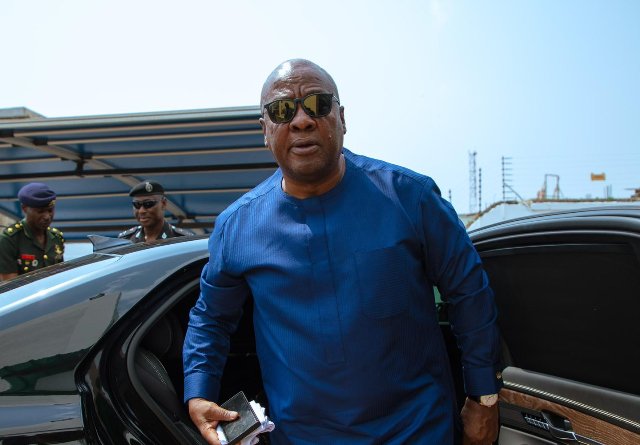Presidential Advisor on the 24-Hour Economy and Accelerated Export Development, Augustus Goosie Tanoh, has laid out an ambitious vision for Ghana’s economic transformation.
Speaking at the post-budget workshop on Sunday, he detailed President John Dramani Mahama’s flagship economic policy, the Trade Power Economy and the Export and Government Program, which seeks to overhaul Ghana’s economic structure by prioritizing production, exports, and job creation.
According to him, the 24-hour economy vision is about building an economy that works for everyone, every hour of the day.
“It is a direct response to Ghana’s structural economic deformities, ensuring that economic activity is continuous and efficient,” he said.
Economic Transformation
Goosie Tanoh presented economic data from 1996 to 2024, highlighting Ghana’s growing dependence on services while manufacturing and agriculture have steadily declined. Crops, once a 32% contributor to GDP, now account for only 20%, and manufacturing has slipped from the third to the fourth-largest contributor.
He said, “If you look at the growth path of our economy, GDP has been rising, but job creation is declining relative to GDP growth. That is a fundamental problem.”
“We cannot continue to rely on an economy where 85% of our exports are primary commodities with little to no value addition.”
Overreliance on imports
One of the key concerns that Mr.Tanoh pointed out is Ghana’s unsustainable import dependence. The country spends $2.4 billion annually on food imports, including $350 million on poultry products alone.
He stated that the economy is structured in a way that makes it heavily reliant on imports—even for necessities like rice, poultry, and cooking oil.
“This trend must be reversed if we are to build a resilient economy that supports local businesses and creates sustainable jobs,” he said.
Three strategic pillars for transformation
The 24-Hour Economy and Accelerated Export Development Program is built on three key pillars: Production Transformation, Market Systems Enhancement, and Human Capital Development.
1. Production Transformation
Tanoh emphasized the need to break the colonial export model by developing an integrated domestic manufacturing system that utilizes local inputs. Currently, 50% of manufacturing inputs are imported, making production costly and uncompetitive.
“We must reduce our dependence on imported inputs and create value within our borders. This means expanding local production, processing raw materials into finished goods, and ensuring that Ghanaian-made products are competitive both locally and internationally,” he urged.
2. Market Systems Enhancement
The vision also aims to develop integrated and efficient market systems that connect producers to consumers, minimize transaction costs, and enhance export competitiveness.
According to him, Ghanaian farmers struggle because the supply chain is inefficient. The cost of moving products from farm gate to the point of export is too high.
“If we are serious about competing with foreign products, we must improve our logistics, storage, and transportation systems,” he explained.
3. Human Capital Development
According to him, with global markets becoming more competitive, Ghana must invest in digital intelligence, technical skills, and workforce productivity to stay ahead.
“Our workers must be equipped with the skills to compete on a global scale. From AI-driven industries to precision agriculture, we need to ensure that our workforce is prepared for the future,” he said.
Seven integrated programs for economic growth
He disclosed that to implement these pillars, the government is launching seven major programs, including:
- SME Financing and Enterprise Support: Establishing a $500 million SME fund and an additional €150 million to provide long-term, low-interest financing for small businesses.
- Agricultural Production Program: Focusing on key value chains such as rice, maize, soybean, and edible oils to reduce import dependence.
- Manufacturing Value Chain Development: Expanding agro-processing, pharmaceuticals, and industrial technology to promote local production.
- Market Expansion Initiatives: Strengthening domestic and regional trade through improved logistics and infrastructure.
- Human Capital and Workforce Development: Training and upskilling workers in technology, automation, and digital intelligence.
- Industrial and Technological Infrastructure: Encouraging local production of machinery and technology to support industrial growth.
- Export Development and Competitiveness: Positioning Ghana as a leader in West Africa’s 425-million-person market by ensuring export-oriented industrialization.
Challenges and implementation strategies
Goosie Tanoh, however, admitted that implementing the 24-hour economy vision would require strong public-private sector collaboration, investment in infrastructure, and policy consistency.
He warned that there will be challenges, but the alternative is worse, and stressed, “if we do not act now, we will continue to experience job losses, economic instability, and a widening income gap.”
The government is working with two major banks and the Bank of Ghana to manage exchange rate risks, ensuring that loans for SMEs remain affordable with interest rates targeted between 5% and 12%.
By Osumanu Al-Hassan/thenewsbulletin24.com


